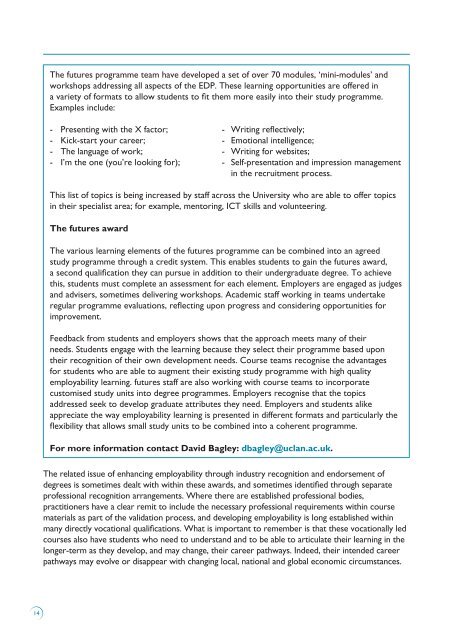Pedagogy for employability - Higher Education Academy
Pedagogy for employability - Higher Education Academy
Pedagogy for employability - Higher Education Academy
Create successful ePaper yourself
Turn your PDF publications into a flip-book with our unique Google optimized e-Paper software.
The futures programme team have developed a set of over 70 modules, ‘mini-modules’ and<br />
workshops addressing all aspects of the EDP. These learning opportunities are offered in<br />
a variety of <strong>for</strong>mats to allow students to fit them more easily into their study programme.<br />
Examples include:<br />
- Presenting with the X factor; - Writing reflectively;<br />
- Kick-start your career; - Emotional intelligence;<br />
- The language of work; - Writing <strong>for</strong> websites;<br />
- I’m the one (you’re looking <strong>for</strong>); - Self-presentation and impression management<br />
in the recruitment process.<br />
This list of topics is being increased by staff across the University who are able to offer topics<br />
in their specialist area; <strong>for</strong> example, mentoring, ICT skills and volunteering.<br />
The futures award<br />
The various learning elements of the futures programme can be combined into an agreed<br />
study programme through a credit system. This enables students to gain the futures award,<br />
a second qualification they can pursue in addition to their undergraduate degree. To achieve<br />
this, students must complete an assessment <strong>for</strong> each element. Employers are engaged as judges<br />
and advisers, sometimes delivering workshops. Academic staff working in teams undertake<br />
regular programme evaluations, reflecting upon progress and considering opportunities <strong>for</strong><br />
improvement.<br />
Feedback from students and employers shows that the approach meets many of their<br />
needs. Students engage with the learning because they select their programme based upon<br />
their recognition of their own development needs. Course teams recognise the advantages<br />
<strong>for</strong> students who are able to augment their existing study programme with high quality<br />
<strong>employability</strong> learning. futures staff are also working with course teams to incorporate<br />
customised study units into degree programmes. Employers recognise that the topics<br />
addressed seek to develop graduate attributes they need. Employers and students alike<br />
appreciate the way <strong>employability</strong> learning is presented in different <strong>for</strong>mats and particularly the<br />
flexibility that allows small study units to be combined into a coherent programme.<br />
For more in<strong>for</strong>mation contact David Bagley: dbagley@uclan.ac.uk.<br />
The related issue of enhancing <strong>employability</strong> through industry recognition and endorsement of<br />
degrees is sometimes dealt with within these awards, and sometimes identified through separate<br />
professional recognition arrangements. Where there are established professional bodies,<br />
practitioners have a clear remit to include the necessary professional requirements within course<br />
materials as part of the validation process, and developing <strong>employability</strong> is long established within<br />
many directly vocational qualifications. What is important to remember is that these vocationally led<br />
courses also have students who need to understand and to be able to articulate their learning in the<br />
longer-term as they develop, and may change, their career pathways. Indeed, their intended career<br />
pathways may evolve or disappear with changing local, national and global economic circumstances.<br />
14

















